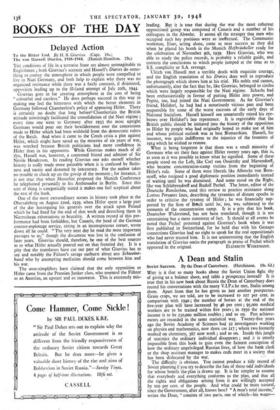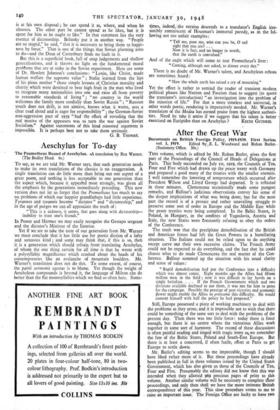A Dean and Stalin
Soviet Success. By the Dean of Canterbury. (Hutchinson. 10s. 6d.) WHY is it that so many books about the Soviet Union fight shy of giving us a balance sheet, and table a prospectus instead? It is true that in his new book about Russia the Dean of Canterbury does record his conversations with the many V.I.P.s he met, Stalin among them. Apart from that he has given us just another prospectus.. Grain crops, we are told, are to be -increased to 107 per cent. in comparison with 194o ; the number of horses at the end of the five-year plan will have increased by 46 per cent ; 95,000 medical workers are to be trained within five years ; in 195o the national income is to be 250,000 million roubles ; and so on. Past achieve- ments are recorded in the same statistical way. Twenty-five years ago the Soviet Academy of Sciences had 52 investigators working on physics and mathematics, now there are 217 ; where two formerly worked on chemistry, 367 now work ; and so on. Inside this jungle of statistics the ordinary individual disappears ; and :t is utterly impossible from this book to gain even the faintest conception of how the ordinary unprivileged Russian lives, of how the bank clerk or the shop assistant manages to makes ends meet in a society that has been dislocated by the war.
The difficulty is obvious. You cannot produce a tidy record of Soviet planning if you try to describe the fate of these odd individuals for whose benefit the-plan is drawn up. It is far simpler to assume that everybody and everything conforms to the plan, and that all the rights and obligations arising from it are willingly accepted by zoo per cent. of the people. And what could be more natural, since the Government, after all, knows best? " A man's total income," writes the Dean, " consists of two parts, one of which—his wages-- is at his own disposal ; he can spend it as, where, and when he chooses. The other part he cannot spend as he likes, but it is spent for him as he ought to like." In that statement lies the very essence of dictatorship. Belinsky put it in another way. " People are so stupid," he said, " that it is necessary to bring them to happi- ness by force." That is one of the things that Soviet planning aims to do—and the Dean of Canterbury finds no fault in it.
But this is a superficial book, full of snap judgements and shallow generalisations, and it throws no light on the fundamental moral problems that are at stake in the Soviet experiment. Here are some of Dr. Hewlett Johnson's conclusions: " Lenin, like Christ, made human welfare the supreme value " ; Stalin learned from the lips of his pious mother " those simple lessons of Christian morality and charity which were destined to bear high fruit in the man who lived to integrate many nationalities into one and raise all from poverty to reasonable standards of living " • " no country in the world welcomes the family more cordially than Soviet Russia " ; " Russian youth does not drift, is not aimless, knows what it wants, sees a clear road ahead and is eager for responsibility " ; the German-Soviet non-aggression pact of 1939 "had the effect of revealing that the real motive of the appeasers was to turn the war against Soviet Socialism." Against statements of this kind reasoned argument is impossible. It is perhaps best not to take them seriously.
G. B. THOMAS.



































 Previous page
Previous page